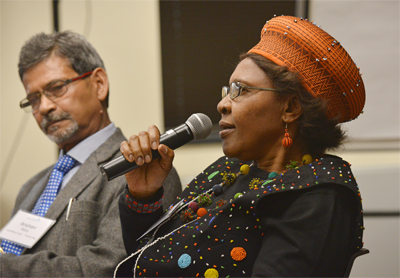World Hypertension Day 2016: Women around the World Take on Hypertension
One morning in April 2012, Funani Juliet was having breakfast in her home in Pietermaritzburg, South Africa, when food started to drip down the right side of her face. Her lips couldn’t hold what she was eating. The retired primary school teacher looked in the mirror and saw nothing odd, but called a friend right away. The friend wanted to take her to a doctor, but Funani opted to go to church to pray. Soon her face started to shake and became contorted to the right side.
Funani Juliet shares her hypertension diagnosis story at an event at Abt Global’s Bethesda office in February 2016.
Photo credit: Doug Trapp. Abt Global When she went to the doctor, she found out that she had experienced a mild stroke and she was diagnosed with hypertension – high blood pressure – and high cholesterol.
World Hypertension Day, observed on May 17, this year is focused on getting more people like Funani to know their blood pressure.
Today, Funani is a symbol of hope, faith, and determined empowerment. She remains on treatment for hypertension and high cholesterol and goes to a clinic for monthly checkups. In February 2016, she traveled to the U.S. for the first time to share her story with the HealthRise project team from the Medtronic Foundation, Abt Global, and other partners.
The stories of courageous women like Funani demonstrate three essential points about hypertension and women:
- Hypertension is not just a men’s health issue. It is a major women’s health issue throughout the world. Contrary to popular belief, hypertension is not more common among men. In fact, women are more likely than men to develop hypertension during three stages of life: When taking birth control pills, during pregnancy, and after menopause. As a result of this misperception, women may not be screened for high blood pressure as often as they should be, particularly in low- and middle-income countries. For example, Abt’s baseline survey for the AstraZeneca-funded Healthy Heart Africa Programme in Kenya found that nearly one quarter of female respondents had not been screened for hypertension even though 87 percent of them had heard of the condition.
- Women’s social networks play a key role in the prevention and management of hypertension. As Funani’s experience demonstrates, friends and faith-based organizations often serve as the first point of contact for women seeking health advice. One of Healthy Heart Africa’s partners in Kenya, Christian Health Association of Kenya (CHAK), is integrating hypertension programming into its existing network of faith-based facilities. In the U.S. and India, the HealthRise project is establishing support groups to empower patients to help themselves and each other in managing their hypertension and diabetes over the long term.
- With timely diagnosis and the right treatment, women who have hypertension can live healthy productive lives. In spite of her hypertension diagnosis, Funani is healthy. She exercises, she attends meetings of organizations for the elderly, and she makes crafts. Although hypertension can lead to heart attacks or stroke, it does not have to. With life style changes and medication, women with hypertension can continue to work, take care of loved ones and, like Funani, even travel across the ocean for the first time.
To learn more about hypertension among women in Kenya and other decision points throughout a woman’s life cycle, please join us at a special event on May 17 at the 2016 Women Deliver Conference in Copenhagen – “As Women Decide: Tipping Points to Improve Health Outcomes.”
For more information about Abt’s presence at Women Deliver, visit our conference page.
